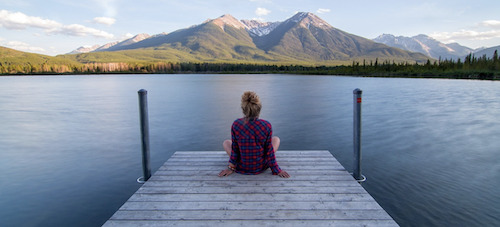2 min read
UPDATE: Why Tourism Offices Should Be Celebrating Gay Marriage
Last fall, Turner PR celebrated the Supreme Court's "decision not to decide" regarding same sex marriage. And we celebrated again when the Supreme...

As the founder of Tourism Lens and a full-time travel news reporter at Bloomberg Pursuits, Lebawit Lily Girma’s passion for storytelling is only matched by her curiosity for uncovering the essence of a destination. With over 15 years of immersion in the travel industry, she covers global tourism through a lens of sustainability, with bylines in esteemed publications such as BBC, Condé Nast Traveler, Skift and National Geographic Traveler, among many others. TURNER hopped on Zoom recently to get Lily's thoughts on a wide variety of topics…
I was pretty burnt out as an attorney. I came out of law school and went straight into a major corporate firm. At some point, it just hit me that this was not the life that I wanted and that I wasn't passionate about the work I was doing. I'm the kind of person that needs to be passionate about what I do.
Travel has always been part of my life. I just had never stopped long enough to think that perhaps it could become work. I also loved to write, so I decided to take a sabbatical. I took a break for about six weeks, which turned into five months. And during that time, I taught myself travel photography. Jamaica was the first place I went, and it just slowly evolved from there. I started a travel blog and started showcasing lesser-known activities and places in the Caribbean, which resonated with readers. That's where it all began.
That started when I began spending long periods on the ground in destinations — more so than most journalists who just fly in for a week or so. I was based in the Caribbean. I would spend my winters in Jamaica, Belize, Grenada, and the Dominican Republic. I spent all of this time just being there, seeing how tourism works and having really unique experiences. That's the kind of travel I've always known growing up and living in other places around the world. I was looking for authenticity, for cultural immersion and connection with people. That always led me to community tourism experiences or just very unique cultural festivals. And I just kept thinking to myself, “well, that's weird because I've never read about this in magazines when it comes to the Caribbean.” And I'd wonder why that is, because all of these experiences are just incredible.
So, I started showcasing that in Jamaica, for example. Things like the Accompong Maroon Festival in January or Treasure Beach, which is much better known now. I felt those experiences were much more representative of Jamaica than the all-inclusive resorts. I've never been an all-inclusive person. I've always preferred staying in family-owned or boutique hotels. It's not really a matter of budget or luxury really; these are mostly properties run by people who are from the place or who have lived in the destination for a long time and cared about it.

I became a guidebook author for Moon Guides, and the nice thing about Moon was that they wanted authors who either lived in or were experts in the destination. They also sought writers with more of a DE&I lens. For my guidebook on the Dominican Republic, I ended up staying a whole year while I was writing it. I was fully immersed, and I went from province to province. I was very fortunate I could do that as a freelancer.
I started to notice a lot of things overall about how tourism functions in the Caribbean — what people don't really know about it, and some of the stereotypes that persist about places like the Dominican Republic. The Dominican Republic could be the most misunderstood destination in the Caribbean. People don't get that it has incredibly diverse and interesting places beyond Punta Cana. I mean, from history to food to the places that you can stay there, and not just the resorts, but the eco-lodges or homestays. There are diverse inland nature and mountain towns that can be quite high-end actually. It’s just a very interesting country and most people don't really know much about it other than Punta Cana or the beaches.
Like any trend, “sustainable tourism” has become a bit of a catch-all term. What does it mean to you?
Obviously, there's the ecological aspect of sustainable tourism. But there's a more holistic way of thinking about sustainability, especially when it comes to tourism. Very early on, I was exposed to what social sustainability is and how tourism as an industry provides a lot of opportunities for entrepreneurs in host communities to elevate their lifestyle and income. But it could also be a double-edged sword. I just became very passionate about showing travelers that you should think about where your money goes when you're taking a trip. It doesn't necessarily mean that you're not going luxury. It just means that maybe [you should] stop and think about the tour operator you're using or the particular hotel you're booking. Look at their relationships with their surrounding communities. Are they really embedded? Do they care?
Tourism provides jobs, of course — but they’re often low-income jobs, right? Because I was there on the ground, I would see how tourism impacted the people who became friends and colleagues every time I came back to work on my guidebooks and stayed for months. These were familiar faces to me, so sustainability wasn’t just a concept. I would hear about their challenges with tourism boards and governments, and I could see that the little guys were not as supported as the big guys. So, I did my part to try to highlight their work and highlight to consumers that the choices you make do make a difference.
How do you see the future of tourism in the post-pandemic era, particularly in terms of sustainability and responsible tourism?
It's not black and white, is it? As far as the environmental side of it, it has a lot more attention now because of global warming and all the disasters we've been witnessing. And there are also laws and regulations coming down on corporations. That's definitely changing things slowly. Not fast enough, but slowly. As far as social sustainability, I think we're a far cry from all the promises that were made during the pandemic. There's a lack of political will and a lack of desire to change things fundamentally. When it comes to social sustainability, I don't know that it's going to change. I think that consumers are changing and they’re increasingly more aware, but I'm not seeing all the momentum that we saw before the pandemic. In some ways, we've gone back to the way things were — in all industries, really. Not just tourism.
I'm seeing a lot more effort being put into covering sustainable tourism — but telling consumers, “do this and don't do that.” I'm kind of tired of seeing the approach of preaching to consumers to convince them to travel better. I’m more excited about finding the middle ground where I can showcase sustainable tourism in an appealing way. I want to explain the impact of certain decisions, but in a way that is engaging. Because at the end of the day, most people just want to go on vacation. What we can do is tell them really meaningful stories about people and exciting things that are happening that will make their travels better.
I hate to lump everyone in one bucket, but — don't pitch the same thing to multiple members of the same team. Then we're all just wasting our time, right? Another thing: I think a follow-up is fine, but if you start following up on the same idea three times, that's probably also a waste of your time and ours. Once we're collaborating on a story, being very quick with queries is something we really appreciate.
Sometimes we'll get PR being very nitpicky about stuff — after it’s been published. Asking, “Can you please include my client even though I know it's already published?” That’s never happening. It's also not a very professional request. Overall, I think it's just a matter of mutual respect. Do I really want to waste somebody's time with XYZ, or can I sort that out myself? Is it that big of a deal?
Try to familiarize yourself with the person's work before you pitch. If you're pitching me food, that’s not me. That’s really easy stuff to find out. But generally, everyone's looking for story ideas. It’s not always about the pitch. It's how you go about it.
Follow Lily's further adventures on Instagram, LinkedIn and TourismLens.com.

2 min read
Last fall, Turner PR celebrated the Supreme Court's "decision not to decide" regarding same sex marriage. And we celebrated again when the Supreme...

Tipped to be a major travel trend for 2024, Silent Tourism and travelers’ quest for “quietude” has surged in the media in early April 2024, thanks in...

Most of us saw the grim report this summer from the Intergovernmental Panel on Climate Change (IPCC), an international team of scientists brought...